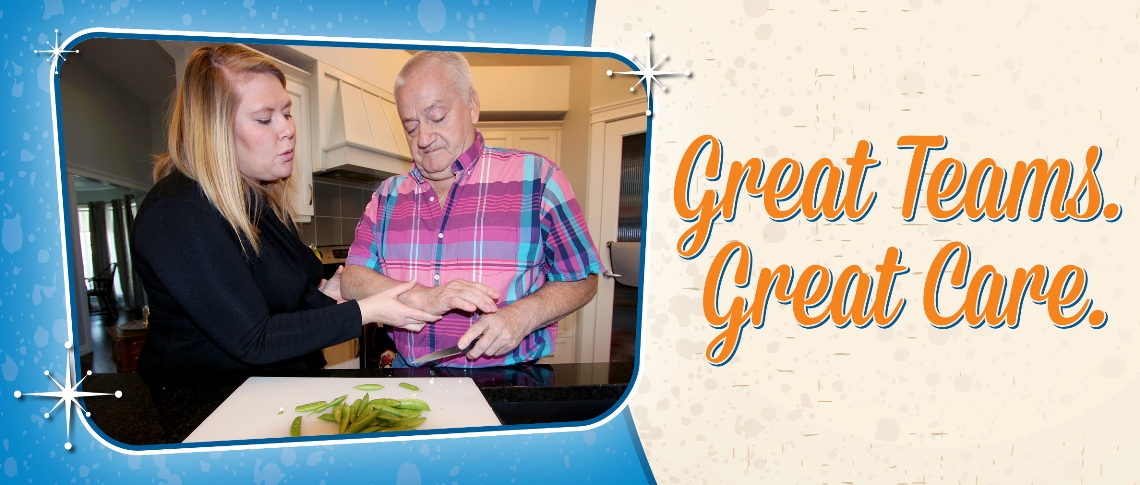

Story by Joanne Neilsen
Marcel Leroux used to help with chores around the house and make a meal at least once a week until he suffered a recent stroke.
As a client of the Early Supported Discharge program, Leroux was able to return home sooner and continue his rehabilitation there with the help of the Lethbridge & Area Stroke team—part of AHS’ Cardiovascular Health and Stroke Strategic Clinical Network.
After his stroke, Leroux’s right arm, hand and leg were weakened and he’d lost some coordination. He found that both cooking and writing were a challenge, so he set goals to regain those skills.
“Clients are at the centre of everything we do. They choose the goals, and we plan therapy activities in their home and community to help them get there,” explains physical therapist and team lead Karen Perry. “Home provides a level of comfort and familiarity that we just can’t duplicate in a hospital setting.”
Each day, members of the stroke team help Leroux take small steps towards his goals—chopping food, getting items out of his fridge, going up and down stairs and into the community.
“Therapy is critical for the first three to six months following a stroke—that’s when the brain has the most potential to make new connections and when clients need to practice skills over and over again,” says Perry.
The team collaborates regularly and adjusts the rehabilitation plan to reflect Leroux’s progress.
“Having the ability to learn daily living skills at home that address real-life challenges is a major advantage for clients and for our team,” says social worker Kelly Munro.
Speech-language therapist Alane W.L. agrees.
“In a client’s home, conversation-starters are everywhere. Their interests are evident in the items they have on display and the hobbies they are so eager to share. Talk flows easily, their speech improves and, I often learn something new.”
This close-knit team practices a trans-disciplinary model of care that sees team members cross-trained in parts of multiple disciplines. Specialists in nursing, social work, and occupational, recreational, physical, and speech-language therapies share their expertise so every team member can help clients achieve their goals. If new therapy skills are needed, they offer team in-services or meet one-on-one. With this approach the client gains from the team’s broad skill set, even if only one team member is present.
This kind of environment is one reason that registered nurse Charlene Friesen joined the team.
“Our team has a wealth of health-care experience,” she explains. “I took the opportunity to job shadow this role before it was available. It opened my eyes to a new career opportunity with a supportive and caring team.”
Fellow team member Crystal Smith says the opportunity for learning and growth is a big benefit of the job.
“There are lots of opportunities at AHS. You don’t have to do the same job forever,” explains the therapy assistant. “You can continue to apply your skills in any number of ways. Right now, I’m fortunate to work with a great team, and I can see myself learning and growing with them for a very long time.”
As for Leroux, he’s improving daily and looking forward to preparing a special anniversary dinner for his wife Debbie.